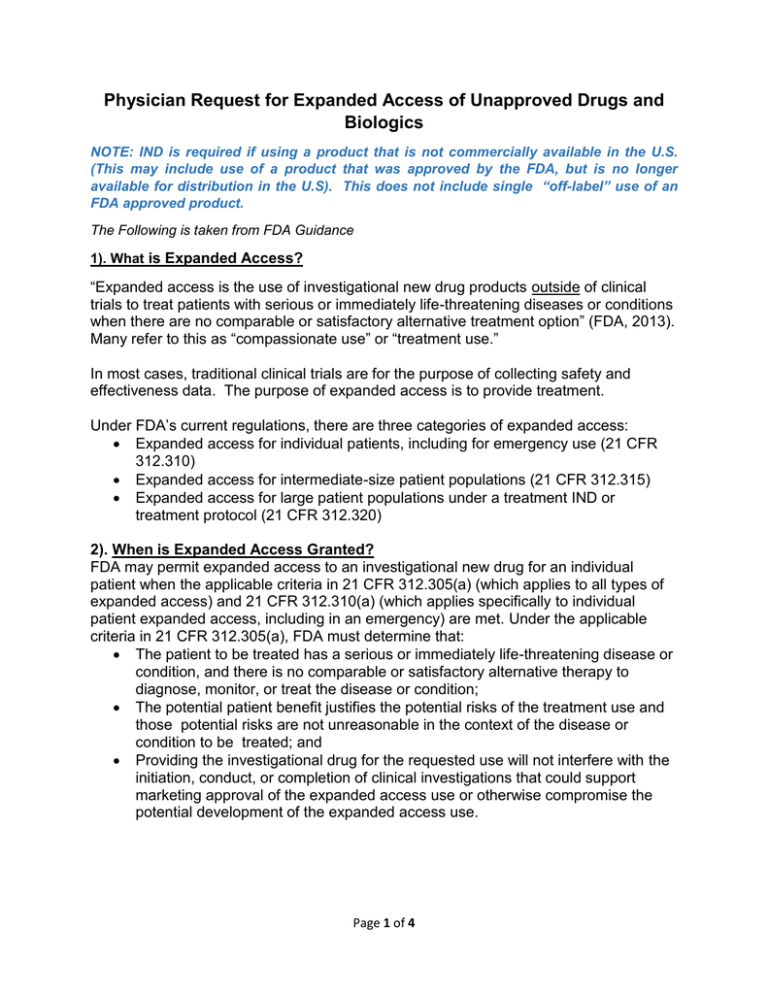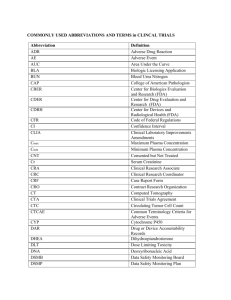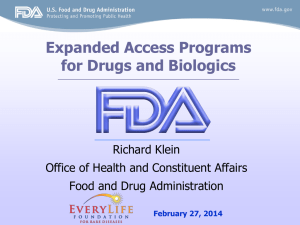Expanded Access of Unapproved Drugs and Biologics
advertisement

Physician Request for Expanded Access of Unapproved Drugs and Biologics NOTE: IND is required if using a product that is not commercially available in the U.S. (This may include use of a product that was approved by the FDA, but is no longer available for distribution in the U.S). This does not include single “off-label” use of an FDA approved product. The Following is taken from FDA Guidance 1). What is Expanded Access? “Expanded access is the use of investigational new drug products outside of clinical trials to treat patients with serious or immediately life-threatening diseases or conditions when there are no comparable or satisfactory alternative treatment option” (FDA, 2013). Many refer to this as “compassionate use” or “treatment use.” In most cases, traditional clinical trials are for the purpose of collecting safety and effectiveness data. The purpose of expanded access is to provide treatment. Under FDA’s current regulations, there are three categories of expanded access: Expanded access for individual patients, including for emergency use (21 CFR 312.310) Expanded access for intermediate-size patient populations (21 CFR 312.315) Expanded access for large patient populations under a treatment IND or treatment protocol (21 CFR 312.320) 2). When is Expanded Access Granted? FDA may permit expanded access to an investigational new drug for an individual patient when the applicable criteria in 21 CFR 312.305(a) (which applies to all types of expanded access) and 21 CFR 312.310(a) (which applies specifically to individual patient expanded access, including in an emergency) are met. Under the applicable criteria in 21 CFR 312.305(a), FDA must determine that: The patient to be treated has a serious or immediately life-threatening disease or condition, and there is no comparable or satisfactory alternative therapy to diagnose, monitor, or treat the disease or condition; The potential patient benefit justifies the potential risks of the treatment use and those potential risks are not unreasonable in the context of the disease or condition to be treated; and Providing the investigational drug for the requested use will not interfere with the initiation, conduct, or completion of clinical investigations that could support marketing approval of the expanded access use or otherwise compromise the potential development of the expanded access use. Page 1 of 4 Under the applicable criteria in 21 CFR 312.310(a): The physician must determine that the probable risk to the person from the investigational drug is not greater than the probable risk from the disease or condition; and FDA must determine that the patient cannot obtain the investigational drug under another IND or protocol. Under current FDA regulations, for all expanded access uses including individual patient access uses, investigators are required to ensure that IRB review and approval is obtained consistent with 21 CFR part 56 (21 CFR 312.305(c)(4)). 21 CFR part 56 requires, among other things, that the IRB review the expanded access use at a convened meeting at which a majority of the IRB members are present (“full IRB review”) (21 CFR 56.108(c)). In a non-emergency situation, a written request (IND) for individual patient use of an investigational drug must be received by the FDA before shipment of and treatment with the drug may begin. These non-emergency requests are known as individual patient INDs. 3). What is Required for Submission of Single Patient IND? (UNC Investigator Request). For drugs and biologics, only a licensed physician can submit a request to FDA for individual patient expanded access. Unless otherwise specified, the UNC physician will be considered the sponsor (holder) of the IND. Physician must have agreement with the drug manufacturer/distributor that they will provide the investigational agent for the specified patient. Physician will need to ask manufacturer/distributor for a letter of authorization to be submitted to the FDA with the request for single patient IND. This letter gives the FDA permission to access and review the manufacturer’s FDA files on behalf of the UNC investigator’s IND. Physician will need to check with UNC Office of Clinical Trials (OCT) to ensure there is a master agreement in place with the company providing the product. If one does not exist, the investigator will need to request a Confidentiality Disclosure Agreement (CDA) from the drug company. OCT can assist with this. The CDA allows the physician to receive confidential information (Investigator Brochure, safety language, etc.) from the company. Contact OCT at 919-8432698. UNC Investigational Drug Service (IDS) will need to be notified of potential IND submission. If oncology subject, Oncology (IDS) will need to be notified. If the drug is being shipped from outside of the US, physician will need the FDA approved IND for the drug to be released through US customs. IDS can be reached at 919-966-1766. Page 2 of 4 UNC IRB review is required for all expanded use requests. If physician is submitting a non-emergency request, prospective IRB review is required before patient can be treated. Unless otherwise specified, patient or patient’s legal authorized representative will be required to sign informed consent for treatment. The IRB and IND application can be submitted in tandem. However, the UNC IRB will not give final approval until the FDA clears the IND request. Please see the following link for the required contents of the FDA IND request. The link also provides contacts for the various divisions within CDER (select based on patient’s diagnosis – not the drug) http://www.fda.gov/Drugs/DevelopmentApprovalProcess/HowDrugsareDevelope dandApproved/ApprovalApplications/InvestigationalNewDrugINDApplication/ucm 107434.htm Note: Patient should not be charged for investigational agent. If you are charging patient, you will need ask for permission from FDA and provide a rationale in your IND request. You will also need to document this in your IRB submission. Physician should inquire within specified FDA division as to how they wish to receive IND request. Some will let you fax the request, while others require the standard hard copy submission in triplicate. If you faxed the request you must follow up with the FDA to ensure it was received. Once submission is received by FDA, the agency has 30 days to respond, if not sooner. The request will be given an IND number. All subsequent submissions to the IND must include this number. Unless otherwise specified, the UNC physician will be considered the sponsor (holder) of the IND. All communications will go to the physician, so it is best practice to provide an additional contact person in the body of the cover letter. This person may also act on behalf of the IND. 4). What is Emergency Use? In an emergency situation, the request to use the drug may be made via telephone or other rapid means of communication, and authorization to ship and use the drug may be given by the FDA official over the telephone. In these situations, known as emergency use INDs, shipment of and treatment with the drug may begin prior to FDA’s receipt of the written IND submission that is to follow the initial request. If UNC physician treats patient under emergency use request, the physician must notify the IRB within 5 days of administering investigational agent. Additionally, the physician will need to provide the required documents (see above link) to the FDA within 15 days of treating patient. The following link has contact and additional information for whom to contact at each division within the FDA. Select the division associated with the patient’s diagnosis (not the drug). Please note the contact information if requesting after normal business hours. Page 3 of 4 http://www.fda.gov/Drugs/DevelopmentApprovalProcess/HowDrugsareDevelopedandAp proved/ApprovalApplications/InvestigationalNewDrugINDApplication/ucm107434.htm For investigational biological products regulated by The Center for Biological Evaluation and Research (CBER), call 240-402-7800. For all other investigational drugs, call 301-796-3400. After working hours, call FDA's Office of Emergency Operations at 1-866-300-4374 or 301-796-8240. 5). Additional Resources Expanded Access: Information for Physicians http://www.fda.gov/NewsEvents/PublicHealthFocus/ExpandedAccessCompassio nateUse/ucm429624.htm Expanded Access (Compassionate Use) http://www.fda.gov/NewsEvents/PublicHealthFocus/ExpandedAccessCompassio nateUse/default.htm UNC IRB Contact Mike Matamoros, (919) 966-3113 matamoro@email.unc.edu Page 4 of 4



